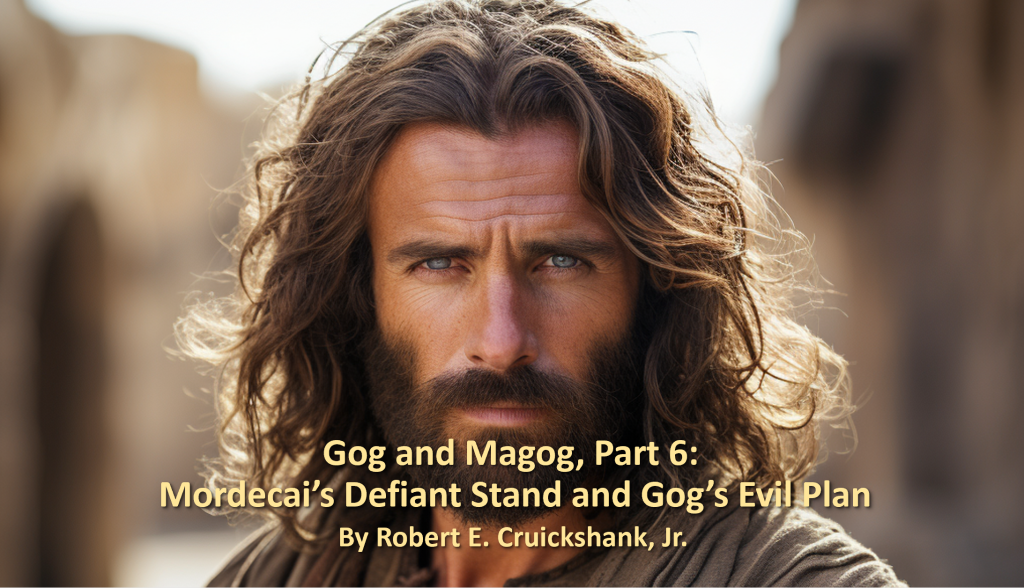Gog and Magog, Part 6: Mordecai’s Defiant Stand and Gog’s Evil Plan
Copyright © Robert E. Cruickshank, Jr. (March 8, 2024)
All Rights Reserved
“This is what the Lord God says: ‘It will come about on that day, that thoughts will come into your mind and you will devise an evil plan’” (Ezekiel 38:10).
In the previous installments in this series, we’ve noted the relationships, similarities, and parallels between the Gog prophecy and the Esther narrative. The trend continues with Ezekiel’s mention of Gog’s “evil plan.” This is yet another dot connecting Gog of Magog (Ezekiel) to Haman the Agagite (Esther).
The word translated “plan” (machashavah), [1] in Ezekiel 38:10, is the same word that is used for Haman’s evil plan to annihilate the Jews, three times in the book of Esther:
“Then Esther spoke again to the king. She fell at his feet and wept and pleaded with him to avert the evil plan of Haman the Agagite and the plot (machashavah) that he had devised against the Jews” (Esther 8:3).
“Esther rose and stood before the king. And she said, ‘If it please the king and if I have found favor in his sight, and if the thing seems right before the king, and I am pleasing in his eyes, let an order be written to revoke the letters devised (machashavah) by Haman the Agagite, the son of Hammedatha, which he wrote to destroy the Jews who are in all the provinces of the king’” (Esther 8:5).
“But when it came before the king, he gave orders in writing that his evil plan (machashavah) that he had devised against the Jews should return on his own head, and that he and his sons should be hanged on the gallows” (Esther 9:25).
Haman’s evil plan (in the book of Esther) and Gog’s evil plan (in the book of Ezekiel) coincide perfectly.
In Ezekiel 38:12, Gog’s objective in attacking Israel is to “seize spoil” and “carry off plunder.” In Esther 3:13, Haman’s goal in annihilating the Jews was to “seize their possessions as plunder.” In Ezekiel 38:13, Gog comes to “carry away” Israel’s “silver and gold.” In Esther, Haman promises to pay the Persian soldiers and line the king’s pockets with the “silver” he acquires from plundering the Jews (Esth. 3:9, 11; 4:7).
Ezekiel 38:12 also speaks of Gog going after the Israelite’s livestock and cattle. In Ezra 1:4, we’re told that the Jewish exiles who returned under Cyrus’s decree brought with them an enormous amount of “silver and gold,” along with “goods and cattle” (see also: Ezra 1:5–11; 2:69; 5:14; 6:5; 7:15–16, 18, 22; Neh. 7:71–72). These are the exact same items mentioned by Ezekiel.[2]
The similarities are impossible to miss. The goal of Gog’s attack was greed. Accordingly, Haman’s goal wasn’t simply to annihilate the Jews. He wanted more. He wanted what they had, and they had a lot.
The Event that Triggered it All
Haman’s entire evil plot to eradicate the Jews and seize their possessions is triggered by one single event – Mordecai’s refusal to bow.
When the king promoted Haman and advanced his authority over all the other princes (Esth. 3:1), all the king’s servants and all who were at the gate “bowed down and paid homage to Haman” (Esth. 3:2a). All but one. “Mordecai,” we are told, “neither bowed down nor paid homage” (Esth. 3:2b).
When the king’s servants asked Mordecai why he was transgressing the king’s command, his reply was simply to tell them that he was a Jew (Esth. 3:3-4). Mordecai was a man of few words, but the few words he chose spoke volumes. There were a thousand years of history loaded into those three words. Haman was an Amalekite. The Jews and the Amalekites had been sworn enemies from the time of the Exodus. Thus, there is no mystery as to the reason for Haman’s defiance.
When the Israelites left Egypt after hundreds of years of bondage, the first thing they encountered after their new-found freedom was Amalek – who came to fight with them at Rephidim (Exod. 17:8). And fight with him they did (Exod. 17:9-12). When it was all over, the Lord said to Moses: “Write this in a book as a memorial and recite it to Joshua: I will utterly blot out the memory of Amalek from under heaven” (Exod. 17:14). With a thousand-year-old grudge match between them, there was no way Mordecai was bowing down to this guy.
Mordecai was a faithful follower of the Lord, and he knew his history. As such, he had no interest in paying homage to the Amalekites. Much to the contrary, he wanted them destroyed. As we’ve seen, that’s exactly what Mordecai and Esther did. They finished the job that was started back in Exodus 17 when their God vowed to utterly blot out the memory of Amalek from under heaven. Mordecai knew his Bible, and he knew what he had to do.
But it wasn’t just ancient history behind those three words, “I’m a Jew.” There was something more recent, in his own childhood, that molded Mordecai into the fearless and godly man that he was.
Echoes of Babylon
In our first installment, we noted that Mordecai’s introduction is given in a level of detail that exceeds any other character in the story.[3] Like Saul, He was a Son of Kish, a Benjamite. As such, the entire conflict between Saul and Agag (Gog) is rebooted with Mordecai the Benjamite and Haman the Agagite (Gogite).[4] In addition to this, the text gives us another important detail regarding Mordecai’s background. According to Esther 2:6, Mordecai was one of the original captives taken to Babylon by Nebuchadnezzar.[5] And Ezra 2:2 and Nehemiah 7:7 mention him by name as one of the returning exiles.
The exile lasted a long time, so Mordecai would have been a very young boy at the time and a much older man by now. But that young boy would witness something in Babylon and carry it with him for the rest of his life. Mordecai would have remembered three slightly older young men (Shadrach, Meshach and Abednego) who stood alone for their God while an entire empire bowed down to the idol of a false god. And he would have remembered how their God delivered those three young men from the fiery furnace and was right there with them in that furnace, as well.
This time, it was an older man in Persia who wasn’t going to bow. With his childhood memories from Babylon racing through his mind, and the courage that surged through his veins, the time had come for Mordecai to be the one to stand alone for his God.
Mordecai remembered two things from Babylon: 1) God’s people don’t bow to their enemies and, 2) when they’re faithful to him, God delivers His people from their enemies. And that is exactly what the Lord did for Esther and Mordecai. And those three words, “I’m a Jew,” said it all.
Those three words, in turn, sparked Haman’s evil plan to eradicate the Jews and confiscate all that they had. It was an evil plan to attack them when they were most susceptible, having no defensive walls to ward off an invasion (Ezekiel 38:11). This vulnerable situation that Ezekiel describes in verse 11 will be the focus of our next installment. And our focus will once again be drawn to the book of Esther. That focus will sharpen as Scripture reveals the deliver whom God would raise up to bring Gog of Magog down.
____________________________________________________________
[1] מַחֲשָׁבָה (ma.cha.sha.vah) ‘plot’ (H4284)
[2] See: Gary DeMar, The Gog and Magog End-Time Alliance: Israel, Russia, and Syria in Bible Prophecy (Powder Springs, GA: American Vision Press, 2016), pp. 60-61. https://store.americanvision.org/products/the-gog-and-magog-end-time-alliance-israel-russia-and-syria-in-bible-prophecy?_pos=1&_sid=458ecc653&_ss=r
[3] https://burrosofberea.com/gog-and-magog-part-1-from-saul-and-agag-to-mordecai-and-haman/
[4] On the terms “Agagite” and “Gogite” being interchangeable, see article 1 in this series: https://burrosofberea.com/gog-and-magog-part-1-from-saul-and-agag-to-mordecai-and-haman/
[5] See: Ezra 2:2; Nehemiah 7:7. See also: Biblical Horizons » 8_06 Esther: Historical & Chronological Comments (IV).



